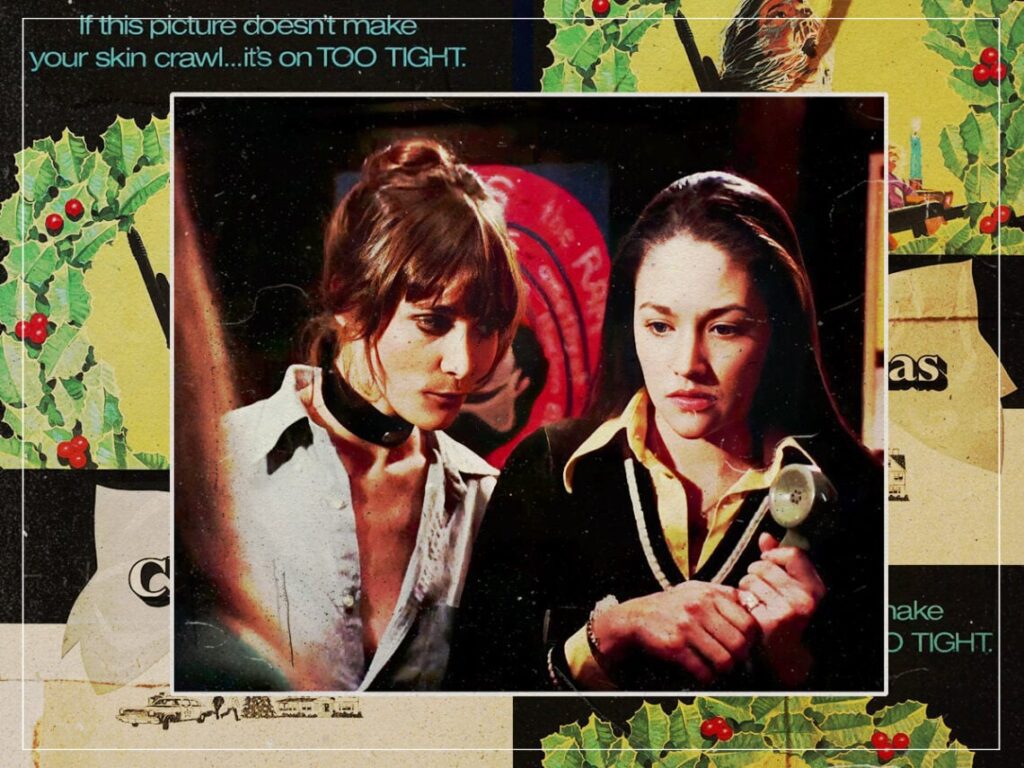‘Black Christmas’: the first-ever festive slasher movie
 Posted On
Posted On
(Credits: Far Out / Warner Brothers)
As a general rule of thumb, Christmas movies don’t tend to reinvent the cinematic wheel. However, Black Christmas laughed in the face of that notion by opening the doors to not just festive-themed tales of terror but the unstoppable expansion of the entire slasher subgenre.
In fact, 1974 proved to be a banner year for crazed serial killers, with director and producer Bob Clark’s knife-wielding nightmare arriving in cinemas only two months after Tobe Hooper’s The Texas Chainsaw Massacre. Beyond that, though, Black Christmas not only introduced tropes that would soon become a staple part of the genre but directly influenced arguably the most seminal slasher of them all.
The movie was inspired by the urban legend of ‘the babysitter and the man upstairs’ – where a teenage childminder receives phone calls that prove to be coming from inside the house. In addition, Canadian filmmaker Moore was also influenced by a string of killings that had taken place during the Christmas period in Montreal, working both elements into his screenplay.
The story sees a group of sorority sisters start getting ominous and increasingly sexualised calls from an anonymous assailant. At first playing along, the group abandon that notion when things become more threatening. However, when bodies begin piling up, they grow increasingly concerned that a serial murderer isn’t just on the loose but tied a lot closer to their social circle than they’re ready to admit.
A single, unnamed, and mysterious perpetrator slowly killing off a close-knit group one by one until only one character – in this case, Olivia Hussey’s Jess – remains sounds formulaic when viewed through a modern lens. And yet, the systematic slaying of the supporting cast until only a ‘Final Girl’ was left was virtually unheard of at the time, even within the parameters of horror.
In an interview with Icons of Fright, Clark revealed how his discussions with an up-and-coming writer and director named John Carpenter over a hypothetical Black Christmas sequel snowballed into something else entirely: “He said, ‘Well, what would you do if you did do a sequel?’ I said it would be the next year, and the guy would have actually been caught, escape from a mental institution, go back to the house, and they would start all over again. And I would call it Halloween.”
As much as it sounds like a plagiarism lawsuit waiting to happen, Clark didn’t think Carpenter ripped him off: “The truth is John didn’t copy Black Christmas. He wrote a script, directed the script, did the casting. Halloween is his horror movie, and besides, the script came to him already titled anyway,” he explained. “He liked Black Christmas and may have been influenced by it, but in no way did John Carpenter copy the idea.”
Of course, Halloween nonetheless shares more than a few strands of DNA with Black Christmas, most notably with Laurie Strode being the last one standing following Michael Myers’ rampage through Haddonfield. Far beyond those two titles, it soon became somewhere between a trend and a gimmick for slashers to set themselves around a certain point on the calendar, an approach that yielded the likes of Friday the 13th, April Fool’s Day, My Bloody Valentine, and many more besides.
Black Christmas proved so popular that it was even remade twice in 2006 and 2019, although it would be an understatement to call either of the re-treads forgettable. The original and best stands alone as a pivotal moment in horror history, not just for the ongoing fascination with holiday homicide, but its significant influence over one of the most popular offshoots big screen scares have ever had to offer.
[embedded content]


